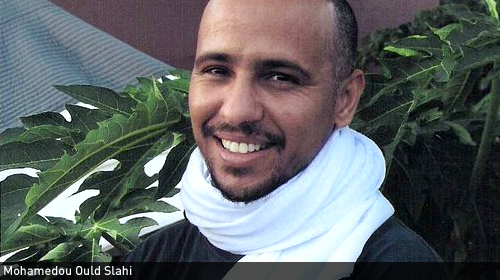
A detailed and harrowing first-person narrative of a prisoner's experiences in Guantánamo is available to the public for the first time: Slate today published a three-part series of excerpts from The Guantánamo Memoirs of Mohamedou Ould Slahi. The excerpts were culled from a manuscript hundreds of pages in length, which Slahi provided his attorneys, a pro bono team of ACLU and other lawyers. After being classified for years, Slahi's memoirs – of arrest, rendition, torture, and imprisonment without charge or trial – are finally seeing the light of day, albeit with some redactions.
The excerpts open at the U.S. Bagram Air Base in Afghanistan, shortly before Slahi was sent to Guantánamo in August 2002. He describes the course of what he calls his "endless world tour": After reporting voluntarily to the police in his native Mauritania for questioning in November 2001, he was rendered by the United States to Jordan, where he was imprisoned for eight months, and then taken to the U.S. prison in Bagram for two weeks before his final transfer to Guantánamo.
The U.S. government initially suspected Slahi of involvement in the so-called "Millennium Plot," and later claimed it had evidence linking him to the 9/11 attacks. (Both Canada and his own government had already cleared Slahi of involvement in the Millenium Plot; Jordan found no reason to justify his imprisonment.) In 2010, after reviewing all the evidence, Judge James Robertson of the federal District Court for the District of Columbia ruled that the government could not prove its allegations, and that much of the evidence presented – Slahi's "confessions" – was obtained under severe abuse. He ordered Slahi released. However, the Obama administration appealed and the Court of Appeals for the D.C. Circuit ordered that a new hearing be held. Learn more about Slahi's history and case from from this timeline and this helpful introduction written by Larry Siems, who edited Slahi's manuscript and also authored The Torture Report, an ACLU initiative documenting the Bush administration's torture program.
In the beginning of his story, Slahi describes his relief upon arriving in Cuba because, as he wrote, "I trusted the American justice system... now we are in a U.S.-controlled territory." But in May 2003, the military began a brutal torture plan called the "Special Project" to break him physically and psychologically. For months, Slahi endured 20+-hour-a-day interrogations, sleep deprivation, physical violence, sexual assault, and other forms of abuse.
He writes:
I was deprived of my comfort items, except for a thin iso-mat and a very thin, small, and worn-out blanket. I was deprived of my books, which I owned. I was deprived of my Quran. I was deprived of my soap. I was deprived of my toothpaste. I was deprived of the roll of toilet paper I had. The cell—better, the box—was cooled down so that I was shaking most of the time. I was forbidden from seeing the light of the day. Every once in a while they gave me rec time at night to keep me from seeing or interacting with any detainees. I was living literally in terror. I don't remember having slept one night quietly; for the next 70 days to come I wouldn't know the sweetness of sleeping. Interrogation for 24 hours, three and sometimes four shifts a day. I rarely got a day off.
Part 1 ends before the "Special Project" comes to a close; it continues in more chilling detail in the second installment. Slahi's descriptions of torture are both difficult to read and impossible to put down. His memoir is a stark personal account of how and why Guantánamo came to be what the New York Times calls an enduring "stain"– on the rule of law, on the United States' human rights record, and on the lives of the men imprisoned there in despair. (Read more here about what's going on today at Guantánamo.)
Slahi's voice—which we can hear only through the memoir—is a distinctive one, and he provides nuanced descriptions of his relationships with his jailors and interrogators, whom he even likens to family. Siems writes in the introduction:
Slahi's writing is much more than a litany of abuses. It is driven by something much deeper: not just the desire to "be fair," as he puts it, but to understand his guards, his interrogators, and his fellow detainees as protagonists in their own right, and to show that even the most dehumanizing situations are composed of individual, and at times harrowingly intimate, human exchanges. The result is an account that is both damning and redeeming.
Learn more about Guantánamo Bay and other civil liberty issues: Sign up for breaking news alerts, follow us on Twitter, and like us on Facebook.


